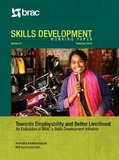| dc.description.abstract | BRAC initiated Skills Training for Advancing Resources (STAR) as a pilot project in 2012 with the aim to provide skill development opportunities to urban youth for securing better employment. Several rounds of quantitative and qualitative data were collected in the years 2012 and 2013 to assess whether the pilot project was able to achieve its goal and also to identify its strengths/weaknesses. Quantitative findings indicate a strong positive impact of the project on the participants’ employment and earnings. In other words, the project appears highly successful in developing the skills of the participants leading to their involvement with different types of income generating activities (IGAs) in the post-intervention period, and consequently in increasing their earnings. Mentionable change has also occurred in the per capita annual income of the program participants’ households, possibly as a result of the children’s successful participation in the project and consequent increase in earning. In 2012 (pre-intervention), the average annual per capita income of households from the comparison group was found to be about BDT 3,713 more than that of households from the treatment group. But the direction of the difference changed drastically in 2013 (post-intervention), with the average annual per capita income of households from the treatment group being about BDT 2,529 more than that of households from the comparison group. A similar change was observed in case of a few more indicators of households’ socioeconomic condition as well. Qualitative information collected from a smaller group of program participants shortly after the training period revealed that all of them were involved in their respective trades in the post-intervention period, i.e. the trades on which they have received training under the STAR project. The project’s strength includes systematic implementation and through the monitoring process, specified detailed logbooks for respective trades, and the project’s overall ability to develop a strong sense of hope among the participants. Challenges included- underage participants; participants’ low level of education, lack of interest (in some cases), irregular attendance, and complicated wording and problematic sequencing of steps in the logbooks, among others. | en_US |

